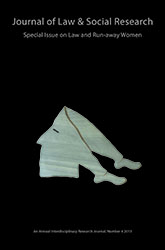The Grammar of Honour and Revenge
DOI:
https://doi.org/10.7146/nnjlsr.v0i4.111092Abstract
There is a rich anthropological literature on honour and revenge, but more often than not, analyses are limited to cultural or historical expressions of the phenomena. As a corollary, the recent re-emergence of honour in Europe is usually explained in terms of non-western immigrants who bring notions of honour as part of their cultural luggage. However, the practice of honour and revenge by Danish Motorcycle Clubs suggests that such an approach is insufficient. The ambition in the article is to go beyond the various cultural expressions and search for a basic ‘grammar’ that can explain why honour becomes a valid theme in some societies and in certain situations. In that endeavour, two questions are vital: What is honour all about? And what is the logic in the perception that lost honour can be restored through revenge? Analysis of a prototypical feuding community in Northern Pakistan concludes that honour is best understood as a family’s publicly recognized capability for self-defence, and that revenge is a means to restore that image if it has been shattered. I contend that honour – in the sense of self-defence – is vital in societies where there is no accessible level of appeal in cases of conflict. Furthermore, the logic of honour that prevails among competing families in Northern Pakistan can also occasionally be recognized at the state level in international politics since there is no reliable supranational level of appeal in cases of perceived injustice.
References
Appadurai A. (2003 ed.) Globalization, Duke University Press, Durham & London.
Bay J. (2002) Honour and Revenge in the Culture of Danish Outlaw Bikers. In Aase T.H. (ed):
Tournaments of Power. Honour and Revenge in the Contemporary World. Ashgate Publications,Aldershot.
Berger P. (1970) On the Obsolence of the Concept of Honour. European Journal of Sociology vol 11: 339-347. Plon, Paris.
Berger P., Berger B., Kellner H. (1974) The Homeless Mind. Penguin, Hammersworth
Beyer P. (1994) Religion and Globalization. SAGE, London.
Bochgrewinck T. (1997) Antropologisk ubekvemmelighet. Norsk Antropologisk Tidsskrift 8: 26-36. Oslo – Bergen.
Bourdieu P. (1979) Algeria 1960. Cambridge University Press, Cambridge.
Christie N. (1985) Hvor tett et samfunn? Universitetsforlaget, Oslo.
Clifford J. & Marcus G.E. (eds 1986) Writing Culture. The Poetics and Politics of Ethnography, University of California Press, Berkeley.
Cohen D. (1996) Law, Social Policy, and Violence: The Impact of Regional Cultures. Journal of Personal and Social Psychology 70:961-978.
Fischer M.M.J. (1986) Ethnicity and the Post-Modern Art of Memory. In Clifford J. & Marcus
G.E. (eds): Writing Culture. The Poetics and Politics of Ethnography University of California Press, Berkeley.
Fuglerud Ø. (2007) Introduction, in Fuglerud Ø. and Hylland Eriksen T. (eds): Grenser for kultur? Perspektiver fra norsk minoritetsforskning. Pax Publishers, Oslo.
Grønhaug R. (1997) Rettsikkerhet, det Multikulturelle, og Antropologi. Norsk Antropologisk Tidsskrift 8: 256-272, Oslo – Bergen.
Groff R. (2000) The Truth of the Matter: Roy Bhaskar’s Critical Realism and the Concept of Alethic Truth. Philosophy of the Social Sciences vol 30 no 3:407-434. SAGE Publications, London.
Hansen F. and Simonsen K. (2004) Geografiens Videnskapsteori. Roskilde University Press, Roskilde.
Knudsen A. (2009) Violence and Belonging. Land, Love and Lethal Conflict in the North-West Frontier Province of Pakistan. NIAS Publication, Copenhagen.
Lien I.L. (2002) The Dynamics of Honour in Violence and Cultural Change. A case from an
Oslo inner city district. In Aase T.H. (ed): Tournaments of Power. Honour and Revenge in the Contemporary World. Ashgate Publications, Aldershot.
Mendible, M (2008) Post Vietnam Syndrome: National Identity, War, and the Politics of Humiliation. Radical Psycology vol 7:1-21.
Moshuus G.H. (2007) Konge og taper – Historien om Vat. Etnografi på gata og kulturoversettelse.
Fuglerud Ø. and Hylland Eriksen T. (eds): Grenser for kultur? Perspektiver fra norsk minoritetsforskning. Pax Publishers, Oslo.
Pitt-Rivers J. (1965) Honour and Social Status. in Peristiany J.G. (ed): Honour and Shame. The Values of Mediterranean Society. Weidenfeld and Nicolson, London.
Putnam H. (1987) The Many Faces of Realism. Open Court, LaSalle Illinois
Sayer A. (2000) Realism and Social Change. Sage, London.
Sen, A (2009) The Idea of Justice. Penguin Books Ltd, London.
Stewart F. H. (1994) Honour. Chicago: University of Chicago Press.
Vayda A. P. (1994) Actions, Variations, and Change: The Emerging Anti-Essentialist View in Anthropology. In Borofsky R. (ed): Assessing Cultural Anthropology. New York: McGraw Hill.
Wikan U. (2003) For Ærens Skyld. Fadime til Ettertanke. (For the sake of honour. Reflecting on Fadime) University Press, Oslo.
Wyatt-Brown B. (2005) The Ethic of Honor in National Crises: The Civil War, Vietnam, Iraq, and the Southern Factor. Journal of The Historical Society vol 4:431-460.
Downloads
Published
How to Cite
Issue
Section
License
Counting from number 12 (2022), articles published in NNJLSR are licensed under Attribution 4.0 International (CC BY 4.0). Readers are allowed to copy and redistribute the articles in any medium or format, to adapt and revise the articles, and use the articles for commercial purposes, provided that the readers give appropriate credits.
No Creative Commons licenses are applied on articles in number 1 (2009)-11 (2021). All rights reserved by the authors. Readers are allowed to download, read, and link to the articles published in volume 1 (2009)-11 (2021), but they may not republish or redistribute these articles without permission of the authors.

